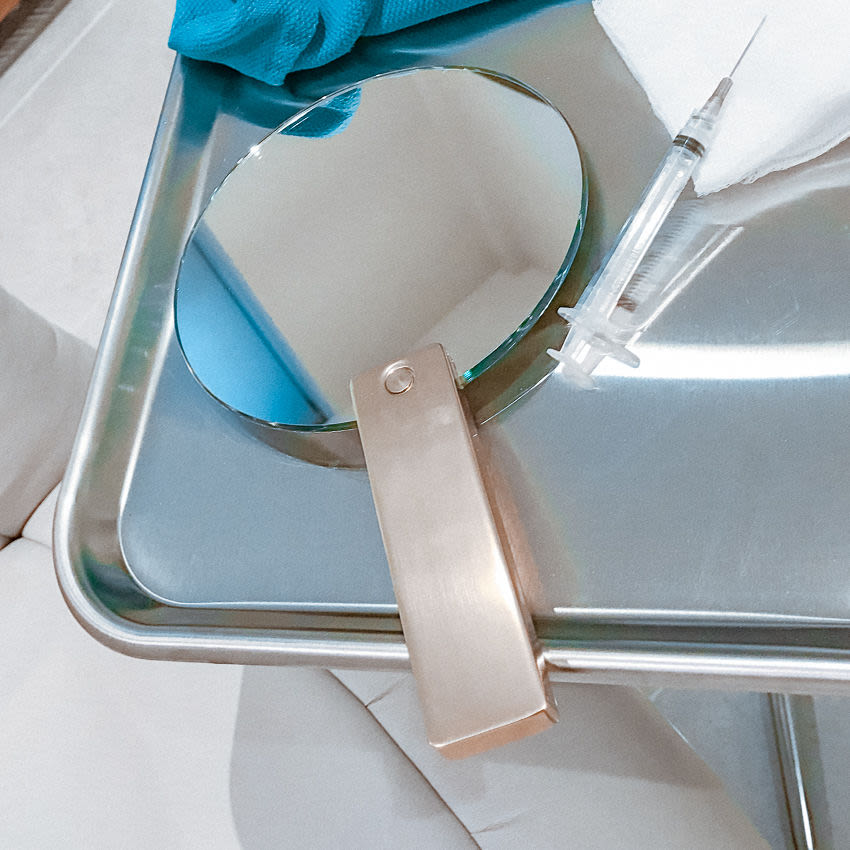Welcome to Ask A Derm, a new monthly feature where board-certified dermatologist Shereene Idriss is on hand to answer your most pressing skin-related questions. Though nothing can substitute a visit to Dr. Idriss’ practice at Union Square Dermatology, think of this as your skincare primer before your appointment date arrives. Get to know Dr. Idriss a bit better through her Top Shelf here, and through her Instagram account, @shereeneidriss. Got a question you’d like Dr. Idriss to answer? Ask away at [email protected].
Dear Dr. Idriss,
After toying with the idea for longer than I care to admit, I’m finally ready to bite the bullet and visit a dermatologist. But not just any dermatologist, one that’s right for me, a 30-something-year-old woman looking to put her best face forward and stifle a few tiny lines that are beginning to take shape. The problem is that I have no clue how to go about this. My parents keep recommending their (and my childhood) derm, and while he was super helpful at putting an end to my dandruff when I was 12, I just don’t see him as a good fit for me when it comes to injectables. And so here I am today, derm-less and a little bit frustrated. Maybe I am overthinking it. What should a person look for when trying to find a dermatologist anyway?
Sincerely,
Down For A Good Derm, And Not Just Any Derm
Dear Down,
First and foremost, make sure that person is qualified. Nowadays, people are throwing out meritless titles left and right. What you are looking for is a board-certified dermatologist, and if you visit the American Board of Dermatology's website, you can look up to confirm any derm’s board-certified status there. There are no other boards of dermatology, so don't be fooled. Finding a dermatologist can feel a lot like dating—maybe you’ll need to visit several before you find a good match. Your search may start with a simple Google query or word-of-mouth (are your friends seeing any dermatologists, and do you like what you see?) Most insurance companies provide lists of available providers, so that’s a good place to start as well. From there, look at the information they’ve chosen to put out into the world: their website, their social media channels, or articles in which they provided quotes. All of those will help you get a sense of what they stand for, and what they can provide. Just be careful when looking at review sites—I cannot overemphasize how unreliable those can be.
Ultimately, you have to go in. Nothing replaces the value of human interaction, and as in any relationship, you have to make sure you feel comfortable with that person. And then take a look around the office. Usually physicians try out new techniques and devices on their staff—are you liking the work? What you see on them will likely be the esthetic your dermatologist provides to you. But while you’re there, it’s important to note that you don’t have to do anything just because you booked the appointment. Listen to yourself if you feel uncomfortable, and if you feel like you're being pushed into trying something, then it's probably not a good sign. It may take time finding the one, but it’ll be worth it when you do.
Shereene Idriss
Dear Dr. Idriss,
I’ll keep this short. It seems like every day I’m reading about some amazing-must-have-life-changing product or treatment that will help my skin thwart signs of aging. It’s so overwhelming! I can’t possibly use them all, and besides that, I feel as though it’s impossible for me to tell what’s better than what. Can you please help me out? What are the five or so best products or treatments (or practices) that really work?
Sincerely,
Coming For My Crow’s Feet
Dear Coming,
Not to sound like a cliché, but avoid the sun. I so wish I had followed this advice when I was younger, especially in my teens when I thought I was invincible and that the sun was my friend. You have to be sun smart every single day. Start your mornings with sunscreen, and reapply, reapply, reapply. If you’re someone who is always out and about, consider investing in some UPF protective clothing. Yes—UV blocking fabric does work!
After that, it’s all about getting to know your skin in order to find a skincare routine that works best for you. There are a lot of gimmicks out there—don't be fooled by them, and stick to the tried-and-true. Retinols are what dermatologists are most unanimously behind when it comes to topical treatments that address signs of aging. Next is vitamin C. Aside from the brightening effects, it’s also a great antioxidant that helps fight free radicals, which can accelerate your skin’s natural aging process. Another ingredient, peptides, also help support collagen production. Defensins, which are a certain kind of peptide, are particularly great to look into as you build your routine—not only do they support collagen production, but they minimize collagen breakdown as well.
For most people, the first sign of aging arrives in the form of skin discoloration. If you notice your skin is starting to look ruddy or discolored, then an easy office treatment is the IPL, which is a light treatment that helps breaks up pigmentation and address redness. That or a Clear + Brilliant laser treatment, which is often called a “baby Fraxel” because it’s less intense. Those are all easy, smaller treatments you can wet your feet with while brightening your complexion at the same time. And a note about Botox: a lot of people come in to my office asking for it because it’s become the gateway injectable. But Botox isn’t always the best solution. Actually, sometimes what you register as fine lines are really a loss in volume, to which fillers (like Restylane, for example) would be a better treatment to deploy. Shocking, I know! But the fact remains that if you understand your skin and the science behind the ingredients you're using, you can curate a beautiful routine from a younger age that's not too harsh, and that will only help you overtime.
Shereene Idriss
Dear Dr. Idriss,
I would describe my skincare knowledge as fairly middle of the road. I know all about the most popular dermatology treatments—Botox, fillers, Retin-A, and lasers—but I know there’s so much more beyond those. Are there any treatments you’d love to see gain more popularity? Or another way to look at it is, what in your opinion is the most underrated dermatology treatment?
Sincerely,
Looking For Hidden Gems
Dear Looking,
I’m so glad you asked this! I love bringing up under-the-radar treatments and products that I think deserve more love. One of those is Ultherapy, which is an ultrasound energy heat device that helps tighten your skin. You can do it every couple of years to maintain skin elasticity and firmness. I understand why it’s not as popular as other treatments—it has a bad rap on review sites—but reading those, I seriously question where the dissatisfied patients received treatment. Again, it’s so important to get treated by a board-certified dermatologist! For example, there was an issue in California where unqualified providers were buying parts for the device from unauthorized retailers, and in turn, the Ulthera malfunctioned and gave some people serious burns. It does not have to be that way! I've done thousands of Ulthera procedures, and I have never had a complication. And if you go ahead and get a treatment for yourself, I think you’ll like what you find.
Shereene Idriss
Photo via ITG.

